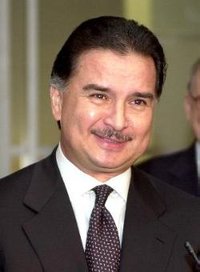Alfonso Portillo
|
|
Alfonso Antonio Portillo Cabrera (born September 24, 1951) is a Guatemalan politician. He served as the President of the Republic of Guatemala from 2000 to 2004.
He took office on January 14, 2000, representing the Guatemalan Republican Front (FRG). Both his campaign and his government were based on advocating a "take from the rich and give to the poor" philosophy and taxation system to try to achieve wealth distribution, thus gain a solid base of popularity and votes from the poor and indigenous within the highly unequal Guatemalan society, but his actual rule was generally considered unsuccessful if not disastrous.
| Contents |
Early career
Portillo obtained his academic qualifications in Mexico. He received a degree in social sciences from the Autonomous University of Guerrero (UAG) in Chilpancingo, Guerrero, and his doctorate from the National Autonomous University of Mexico (UNAM) in Mexico City. In the late 1970s he became involved with left-wing indigenous groups in Guerrero and with the Guatemalan National Revolutionary Unity (URNG). During the 1980s he lectured in political science at the university in Chilpancingo. During that time, Portillo killed two students, a crime for which he was acquitted on the grounds of legitimate self-defence.
In 1989 he returned to Guatemala and joined the Social Democratic Party (PSD), that had replaced the Authentic Revolutionary Party the previous year, and was a little known party, one of the very few leftist parties left in existence after the military repression during that decade. He then moved to the Guatemalan Christian Democrats (DCG), a centre-right formation which at the time was the governing party. In 1992 he was appointed Director of the Guatemalan Institute of Social and Political Sciences (IGESP), a role he held till 1994. He became the DCG's Secretary General in 1993 and was elected as one of their deputies in 1994, and became head of their group in the National Congress. During this time he also became an editorial advisor to the Siglo Veintiuno (21st Century) newspaper.
FRG
In April 1995 Portillo, along with 7 of the other 13 DCG deputies, left the party to become independents after the parliamentary group were accused of corruption. On the 20th July he joined the Guatemalan Republican Front (FRG). It's leader Efraín Ríos Montt was at the time leader of the National Congress. When Montt was barred from running in the November 12th presidential election the FRG chose Portillo as their candidate. After gaining 22% of the vote he passed to the second round on January 7th 1996 where he lost to Álvaro Arzú. With both candidates promising to finalise the peace negotiations Portillo narrowly lost, gaining 48.7% of the vote.
Presidential aspirations
In July 1998 the FRG voted for him to be their presidential candidate the following year, having decided not to postulate Ríos Montt in the role. Confirming this postulation in June 1999 Portillo launched a campaign in favour to bring morality into political life, to implacably fight corruption, to defend the indigenous population and the poor campesinos against the small, urban, white elite. He also promised security in the face of the growing problem with delincuency during Arzu's tenure in the office. Unlike in 1995 the issue of the homicides in Mexico were brought up, and became a central electoral issue. Portillo immediately recognised that he had shot the 3 students, but claimed it was self defence. He said that he had fleed from the Mexican authorities, rather than face trial, both because of his political affiliations, and because he was a foreigner in Mexico. These revelations enhanced Portillo's as a "tough, no-nonsense" politician. He was also accused during the campaign of being Ríos Montt's marionette. On 7th November he won the first round with 47.8% of the vote, and in the second round on December 26th he beat Oscar Berger by gaining a resounding 68.3% of the vote.
President
On the day of his investiture Portillo said that Guatemala was "on the edge of collapse", and promised a thorough government investigation into corruption. On the 9th August 2000 he declared that the Government's of the previous 2 decades had been involved in human rights's abuses, including for 2 massacres that took place while Ríos Montt was President. While he showed determination to see through his regenerative and progressive programme, his government soon became overwhelmed by the reality of the political and mafia corruption in the country. During 2001 his government faced a continuous wave of protests that sapped the credibility of his government. The FRG were accused of bringing corruption on an unprecedented scale to the country. His government has been tainted by accusations of theft, money laundering, money tranferring to the army, creation of bank accounts in Panama, Mexico, and the USA by many members of his staff, totalling more than 1 billion US dollars.
In the first round of the November 2003 elections (see: Guatemala election, 2003), he backed former dictator Efraín Ríos Montt to succeed him. However, the FRG lost to Óscar Berger's PAN party, and he was sworn in to replace Portillo on January 14, 2004.
Recent events
When his political immunity was revoked on February 19 2004 Portillo immediately fled to Mexico. On August 16, 2004, immigration authorities there granted him a year-long work visa. He lives in Mexico City in an apartment in one of the city's most exclusive neighbourhoods.
Investigations are currently underway as to whether he received $1.5 million in bribes from the Taiwanese government.
External links
Biography in Spanish (http://www.cidob.org/bios/castellano/lideres/p-004.htm).
| Preceded by: Álvaro Enrique Arzú Irigoyen |
Presidents of Guatemala | Succeeded by: Óscar Berger Perdomo |

